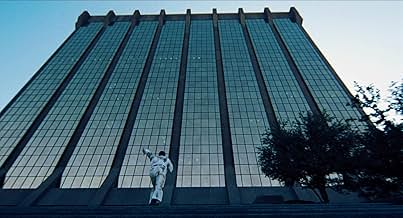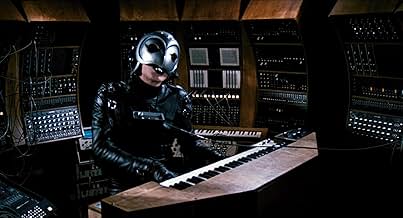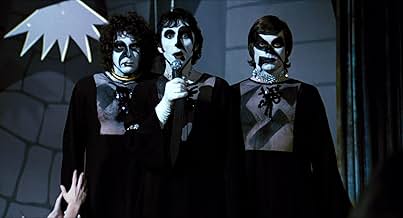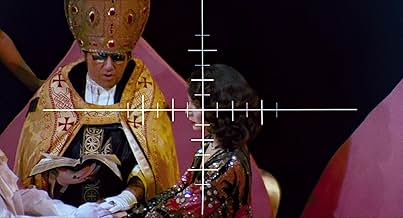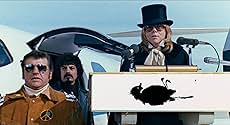अपनी भाषा में प्लॉट जोड़ेंA disfigured composer sells his soul for the woman he loves so that she will perform his music. However, an evil record tycoon betrays him and steals his music to open his rock palace, The P... सभी पढ़ेंA disfigured composer sells his soul for the woman he loves so that she will perform his music. However, an evil record tycoon betrays him and steals his music to open his rock palace, The Paradise.A disfigured composer sells his soul for the woman he loves so that she will perform his music. However, an evil record tycoon betrays him and steals his music to open his rock palace, The Paradise.
- 1 ऑस्कर के लिए नामांकित
- 3 जीत और कुल 5 नामांकन
- The Juicy Fruits
- (as Harold Oblong)
- …
फ़ीचर्ड समीक्षाएं
Here we have a film that exists in 3 levels (at least 3 that matter to me):
- this is a film within a social and cultural context. The kind of music we hear here (not the multiple parodies, but the music that is intended to be "good") was a reaction to the 60', or the next step of the evolution. Within the same underground spirit that created this film, there was a growing tendency to extend and invent forms that would accommodate the fantasies of new musicians. That's what today we know as progressive rock. This film would pave the way for Tommy, for Live at Pompei, and for The Wall.
- Paul Williams, great mind, great talent. Much of what works here is his vision, from the mood even to some roots of the story. His parodies are great, but his real stuff is good enough. I enjoyed getting to know him better, and it Is funny that he comes to perform the guy who steals his own music.
- de Palma, who was my first interest when coming to this. The fact is i didn't know so well what to expect, and i ended up appreciating more the other levels than this one of the director. Apparently by this time he had clarified what he wanted to explore, but he was far from mastering any of his enormous visual skills, or this film was such a collective work that he just couldn't make his personal statement so well. Anyway we have here eventually the first split screen of his career (i'm not absolutely sure of this), something he would take all his careers with incredible results. Other than that, we don'te have his magical camera eye yet.
The story matters only for the fact that we have a battle between creative and money grower, something that all the people involved here might know pretty well back in those days.
Jennifer Harper has a pretty face, and illuminates the set when she sings.
My opinion: 4/5
http://www.7eyes.wordpress.com
Whereas "Rocky Horror" remains a farce all the way through, "Phantom of the Paradise" is a real tragedy in the original meaning : the story of a genial but naive musician who gets his work swindled by an evil baby-faced producer who has sold his soul to the Devil. Besides, "Phantom" is more a film about music or a film with songs in it than a proper musical, and it's better so because the story is really interesting. Like "Rocky Horror", " Phantom" is full of parody and incredible gimmicks, but the plot and the soundtrack are far superior, and on the whole, "Phantom" has a lot more class.
Many people who have seen the movie when it was released were teenagers, and it's one of those movies I know many people to have seen ten times or more. Looked at from a mature point of view, it is true that "Phantom" appears somewhat kitsch and not so profound, and it is obvious that the director must have had great fun shooting such a delirious show. But let's say then that as "typical midnight movie", "Phantom of the Paradise" remains a gripping and creative kitsch masterpiece, and still keeps up with its cult movie status thirty years after. That's what classics are all about.
Countless scenes and details would deserve comments, but let's say that two of them are really hard to forget: when the hero gets his face destroyed in a record-press after his escape from Sing-Sing in a toy box, and when he murders the campy music-hall star who usurped his music in the middle of the stage, by shooting a neonlight across his chest as the climax of a hysterical rock concert.
Interesting to know that the same three singers successively impersonate a parody of a sixties group with banana hairdos and falsetto voices, a nutty band in pants and wigs, and finally appear with ominous black and white make-up in a hard-rock performance that reminds of "Kiss". I guess you wouldn't tell if you didn't know.
The casting is very good although none of the actors seemed to have achieved real stardom. You don't get to see so much of William Finley because he wears a mask throughout much of the film, but Paul Williams, who has had a rather mediocre singing career, was perfect for the role as machiavelic producer Swan. The angelic blond face and the malign nature of the character make a very powerful contrast.
However, I found the most impressive performance was given by Jessica Harper. Her big dark eyes and deep voice make her stand out both as an accomplished actress and singer. Her talent has been unfortunately never used any better than in this movie, which was her first star role, and that's "the hell of it".
As for director Brian de Palma, I have not seen many of his films outside of this one, so I'm not too sure, but it looks like "Phantom" really has a place apart in his career. For instance, "Carrie", which got more attention, appeared very disappointing to me in comparison, much more like a B-grade horror flick. Mr de Palma certainly seems to have a fascination for blood, and "Phantom" has of course its fair share of it. Contracts are even signed with blood instead of ink...
This is the best horror film I've seen by De Palma. While it is mostly tongue-in-cheek, it does feature one of the most suspenseful uses of his trademark "split screen." The story is great--a surprisingly clever indictment of the music industry. The music is wonderful if you like glam, though the songs that Jessica Harper (the Christine figure) sings seem out of place and are about as deadpan as her performance. Gerrit Graham is a riot as Beef and steals every scene he is in. I recommend "Phantom of the Paradise" to fans of over-the-top productions such as Rocky Horror, as well as anyone looking for a unique twist on a classic tale that doesn't take itself too seriously. My Rating: 7.5/10
क्या आपको पता है
- ट्रिवियाThe record press in which the character Winslow Leach is disfigured was in fact a real pressing plant (it was an injection-molding press at an Ideal Toy Company plant). William Finley was worried about whether the machine would be safe, and the crew assured him it was. The press was fitted with foam pads (which resemble the casting molds in the press) and there were chocks put in the center to stop it from closing completely. However, the machine was powerful enough to crush the chocks that it gradually kept closing. It is commonly believed that Finley pulled his head out of the press just in time to avoid being injured, and that his scream in that scene was genuine, but this is an exaggeration. Finley was quickly pulled out by grips and the record press scene, along with most scenes in the movie with little dialogue, was filmed without sound, and the talking and sound effects were dubbed in later. At a Phantom of the Paradise convention, Finley exaggerated the story and said that his scream was "for real", although he may have meant that he was able to conjure up a very real scream in post-production by thinking back to his memories of the incident.
- गूफ़Videotape was still only in the experimental development phase in 1953, when Swan records his suicide note/contract, and at that it was only capable of black and white images. Color, broadcast quality videotape of the kind depicted here was not available until the late 1950s.
- भाव
The Phantom: [to Beef] Never sing my music again. Not here, not anywhere. Do you understand? Never again. My music is for Phoenix. Only she can sing it. Anyone else who tries, dies!
- क्रेज़ी क्रेडिटThe closing credits feature a series of montages of the cast members, identifying each by name, starting with the musical trio (Oblong, Hahn, Comanor) and concluding with William Finley as Winslow/The Phantom. These montages are made up of shots ostensibly from the movie, and most of them are, but there are also numerous outtakes.
- इसके अलावा अन्य वर्जनIn the pre-release (or press) prints of the movie, the scene where Winslow was disfigured by the record press was longer; His disfigured face was briefly seen steaming with smoke from the press, and Winslow then killed the cop that surprised him (and shot him in the leg, which explained why Winslow walked with a limp for most of the film; however, he was able to run with the greatest of ease towards the end). The scene was removed from subsequent versions, as it was best decided that Winslow's disfigured visage be revealed at the end of the film.
- कनेक्शनFeatured in Terror in the Aisles (1984)
- साउंडट्रैकGoodbye, Eddie, Goodbye
Written by Paul Williams
Performed by Jeffrey Comanor, Archie Hahn and Peter Elbling as The Juicy Fruits, lead vocal Archie Hahn
टॉप पसंद
- How long is Phantom of the Paradise?Alexa द्वारा संचालित
विवरण
- रिलीज़ की तारीख़
- कंट्री ऑफ़ ओरिजिन
- भाषा
- इस रूप में भी जाना जाता है
- Un fantasma en el paraíso
- फ़िल्माने की जगहें
- उत्पादन कंपनियां
- IMDbPro पर और कंपनी क्रेडिट देखें
बॉक्स ऑफ़िस
- बजट
- $13,00,000(अनुमानित)
- दुनिया भर में सकल
- $2,245
- चलने की अवधि1 घंटा 31 मिनट
- रंग
- पक्ष अनुपात
- 1.85 : 1
इस पेज में योगदान दें



